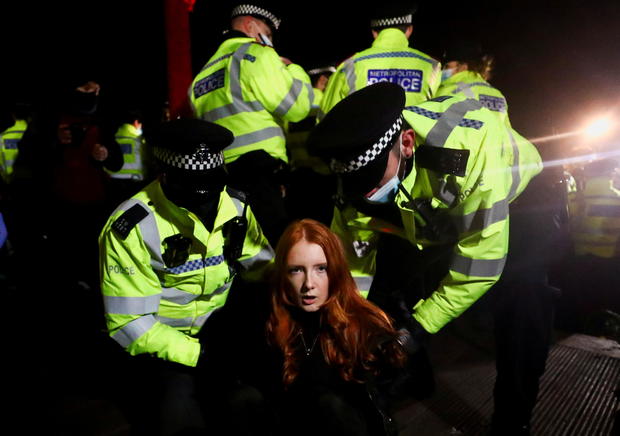London – Protests continued Monday in London after thousands took to the streets over the weekend to demonstrate against gender-based violence. Activists had applied to hold a socially-distanced vigil on Saturday for 33-year-old Sarah Everard, whose body was found last week after she went missing while walking home in the evening through well-lit London streets.
The man accused of killing Everard is a police officer who had been reported for indecent exposure just days before Everard’s death.
Permission for the Saturday vigil was denied because the U.K. is under a national coronavirus lockdown. That didn’t stop hundreds of people, mainly women, from showing up at a park near where Everard was last seen in south London. After about an hour, police moved into the peaceful crowd forcefully, eventually arresting four people, two of them teenagers.
“I find it outrageous that the police, the Metropolitan Police, who murdered Sarah — they murdered her — and they’re telling us that we’re not allowed, we don’t have permission to come show solidarity. They killed her,” 26-year-old Alexandra told CBS News at the demonstration on Saturday night.
“I’ve come because my heart is broken. My heart is broken for Sarah, my heart is broken for all the times that I’ve been assaulted, for all the times my friends have been assaulted,” she said.
Anger grew quickly over the police’s handling of the Saturday demonstration, and thousands took to the streets of central London on Sunday in protest.
Violence against women
Everard’s murder has sparked a national debate about violence against women and how it’s treated in the U.K. Britain has record-low levels of of rape prosecutions, despite an exponential increase in reports of rape over recent years.
Prime Minister Boris Johnson convened a meeting of the government’s crime and justice task force on Monday to discuss its strategy on violence against women and why rape prosecutions are so low. Britain’s police chief constables were also set to hold an emergency meeting on the subject.
The protests have also highlighted the actions of London’s Metropolitan Police, which officials including London Mayor Sadiq Khan and U.K. Home Secretary Priti Patel have criticized. There are growing calls to scrap pending national legislation that civil liberties groups say would increase police powers to curtail protests.
“We’ve learned one thing this weekend: It’s the right to protest, the right to gather, the right to have a voice is fundamental to our democracy, and particularly British democracy,” former chief constable Sir Peter Fahy told a local radio station. “You’ve got to be really wary of more legislation being rushed through just because certain politicians didn’t like certain demonstrations in the summer,” he said.
“We’ve all experienced some kind of sexual violence or some kind of assault or feeling unsafe and enough’s enough,” Sarah, 32, told CBS News at the vigil Saturday night. “This needs to be a turning point so that we just don’t accept feeling scared, feeling intimidated and we can live our lives freely like our male counterparts can.”
“I want men to change,” said Alexandra, 26. “I want this whole culture to change. I want us to not feel like it’s normal to be scared all the time.”


